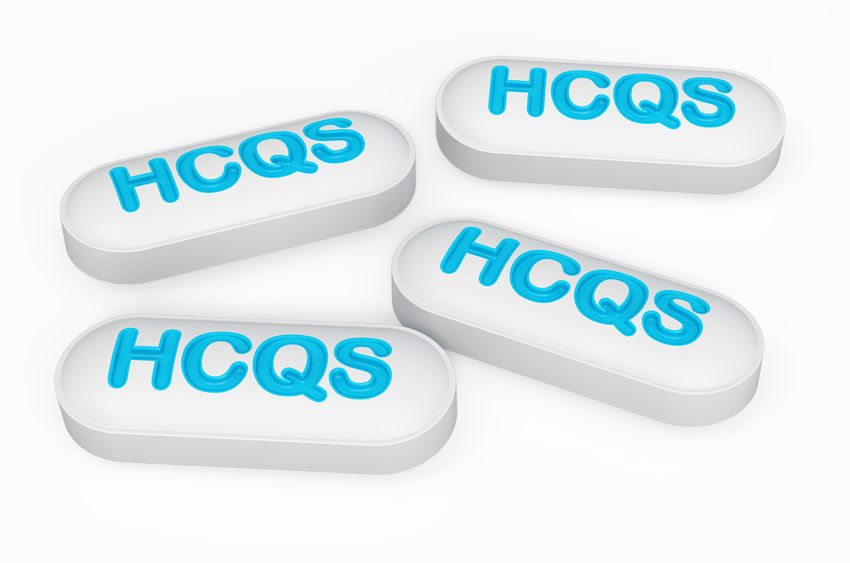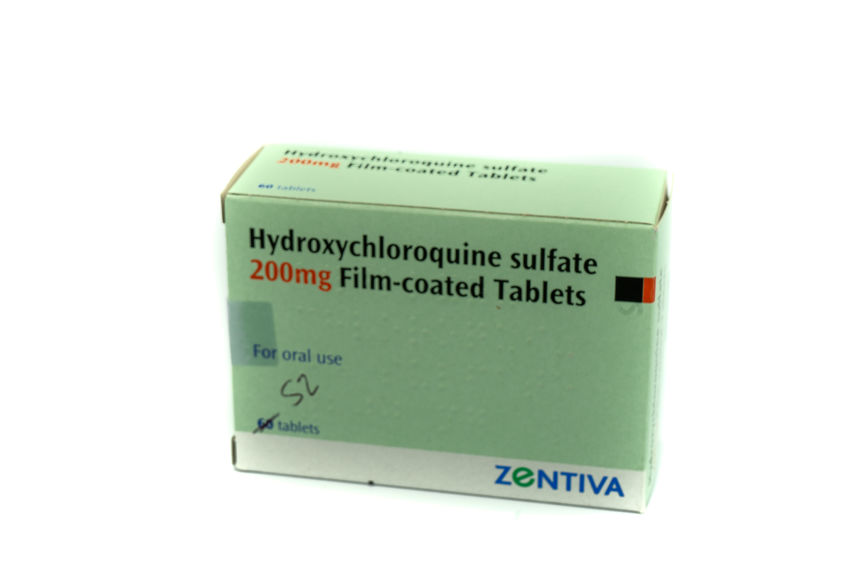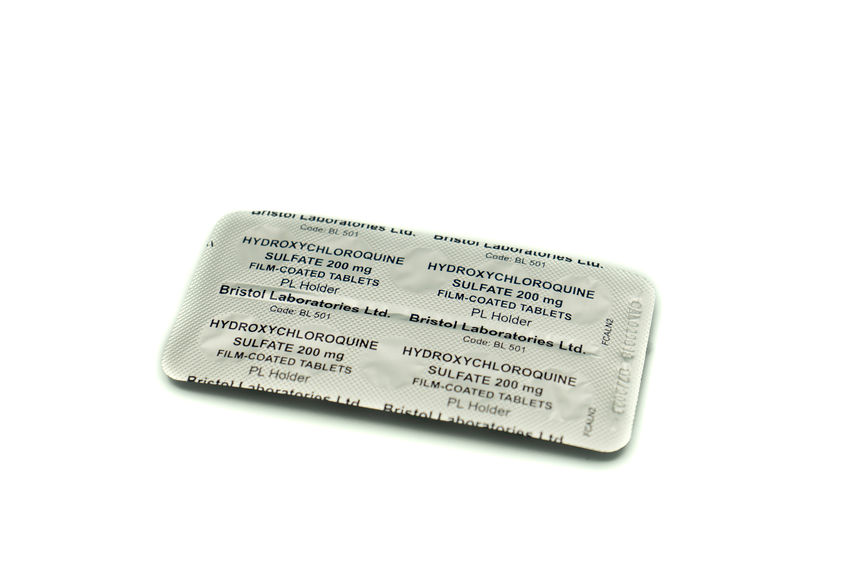
Hydroxychloroquine & COVID-19: An Update
 July 29th, 2020
July 29th, 2020 Nakita Cambow
Nakita Cambow Latest News
Latest News 0 Comments
0 Comments
Since the start of the novel coronavirus (SARS-CoV-2) pandemic in March there has been much media attention around hydroxychloroquine. There have been reports of it being a “wonder drug” for the treatment of COVID-19, the condition caused by SARS-CoV-2, so much so that even the President of the USA was taking it! The American Food and Drug Administration (FDA) granted approval for the emergency use of hydroxychloroquine in treatment of COVID-19 at the end of March, only to reverse this decision 10 weeks later.
Some reports have suggested that hydroxychloroquine may be unsafe, whilst others warn of global drug shortages. In this article, we aim to reassure all lupus patients that hydroxychloroquine is a safe drug, and that if it has been recommended by their rheumatologist as a treatment for lupus or related conditions (eg discoid lupus rash), that it is important that they continue to take it.
Hydroxychloroquine is an important treatment for lupus
 Hydroxychloroquine has been used to treat lupus since the 1950s and it remains a regular medication for the majority of patients with lupus. Such is the importance of hydroxychloroquine that the British Society for Rheumatology (BSR) and the European League Against Rheumatism (EULAR) guidelines recommend that it is given to all patients (unless there are individual reasons not to). It is compatible with both pregnancy and breastfeeding and was shown first to improve outcomes of pregnancy in a clinical trial nearly 20 years ago. In terms of lupus disease, hydroxychloroquine can reduce active disease (particularly rashes and arthritis), reduce the frequency of lupus flares and in most cases allow less steroid to be used. There is also emerging evidence that hydroxychloroquine lowers the risk of heart disease, prevents kidney damage and reduces the risk of blood clots in patients who also have antiphospholipid syndrome.
Hydroxychloroquine has been used to treat lupus since the 1950s and it remains a regular medication for the majority of patients with lupus. Such is the importance of hydroxychloroquine that the British Society for Rheumatology (BSR) and the European League Against Rheumatism (EULAR) guidelines recommend that it is given to all patients (unless there are individual reasons not to). It is compatible with both pregnancy and breastfeeding and was shown first to improve outcomes of pregnancy in a clinical trial nearly 20 years ago. In terms of lupus disease, hydroxychloroquine can reduce active disease (particularly rashes and arthritis), reduce the frequency of lupus flares and in most cases allow less steroid to be used. There is also emerging evidence that hydroxychloroquine lowers the risk of heart disease, prevents kidney damage and reduces the risk of blood clots in patients who also have antiphospholipid syndrome.
Hydroxychloroquine and COVID-19
 At the beginning of the COVID-19 pandemic in early 2020, some laboratory studies suggested that hydroxychloroquine could affect the ability of the virus to replicate. This led to a number of small studies being published quickly, often without adequate specialist review, showing that hydroxychloroquine may reduce the levels of virus in the blood and/or reduce the severity of the infection. Many of these studies did not contain a control group (e.g. a group of patients that received a dummy drug or placebo), which can result in some bias in the results. Larger, well-designed clinical trials were needed and a number of studies were set up across the globe.
At the beginning of the COVID-19 pandemic in early 2020, some laboratory studies suggested that hydroxychloroquine could affect the ability of the virus to replicate. This led to a number of small studies being published quickly, often without adequate specialist review, showing that hydroxychloroquine may reduce the levels of virus in the blood and/or reduce the severity of the infection. Many of these studies did not contain a control group (e.g. a group of patients that received a dummy drug or placebo), which can result in some bias in the results. Larger, well-designed clinical trials were needed and a number of studies were set up across the globe.
In May 2020, hydroxychloroquine hit the headlines again after a large study of nearly 100,000 patients reported increased risk of abnormal heart rhythms in people taking hydroxychloroquine (either alone or in combination with the antibiotic azithromycin) for the treatment of COVID-19. Two weeks later this study was withdrawn from The Lancet due to serious concerns about the data. Unfortunately, much of the damage had already been done and a number of trials were terminated. Even if this study was flawed, very high doses of antimalarial drugs, as were used in this study and another study, may still cause some concern. A Brazilian study of chloroquine (the predecessor to hydroxychloroquine, which is used infrequently now in lupus) was also stopped due to heart rhythm abnormalities in the high dose group. Although this study was well-designed, the doses of chloroquine were extremely high. A typical dose of chloroquine for a patient with lupus might be up to 250mg a day. In this study patients received 600mg twice a day; nearly 5 times higher than the usual dose. Heart rhythm abnormalities are rare at the doses that hydroxychloroquine (or indeed chloroquine) are used to treat lupus. Hydroxychloroquine is preferred for lupus, as it has less risk of side-effects than chloroquine, but it is not available in all countries worldwide.
Recently the RECOVERY trial, a large clinical trial conducted across over 175 sites in the UK, found no benefit of hydroxychloroquine in the treatment of COVID-19. However this isn’t the end of the hydroxychloroquine and coronavirus story; the COPCOV study (which has been restarted after being temporarily suspended) is looking at whether hydroxychloroquine can prevent people from catching the virus. To date, the impression is that lupus patients in general have not suffered as badly as might have been expected from COVID-19, although it is not clear if this is due to benefits of their drug therapy for lupus and/or more rigorous attention to strategies to prevent being infected such as hand-washing, social distancing and shielding.
Should I continue to take hydroxychloroquine?
 The short answer is yes. Hydroxychloroquine remains an important treatment for patients with lupus as the alternative therapies are more likely to cause side-effects and most need more regular blood tests. It is very safe providing that patients taking hydroxychloroquine are on an appropriate dose for their weight and kidney function. Current recommendations for lupus (published by EULAR in 2019) are for a long-term dose hydroxychloroquine of 5mg/kg/day to reduce the risk of damage to back of the eye (retinopathy) with prolonged treatment; although this is very rare with less than 10 years of treatment in people with normal kidney function. After 5 years of therapy, specific hospital eye tests are now recommended on a yearly basis by the Royal College of Ophthalmologists and these should be arranged by your rheumatologist or GP. Heart problems due to hydroxychloroquine are extremely rare and outweighed by the benefits of controlling lupus disease and reducing flares. In fact, hydroxychloroquine is likely to reduce the risk of heart attacks that are recognised to be more common in lupus patients than in the general population. It is still unknown whether hydroxychloroquine will reduce your risk of catching the new coronavirus but there is no evidence that it will increase your risks of complications. So if you develop COVID-19, it is recommended that you continue to take hydroxychloroquine, as the risks associated with a lupus flare and needing steroids are greater than the risk of any problems from taking it at your usual dose during COVID-19 infection unless you develop renal failure.
The short answer is yes. Hydroxychloroquine remains an important treatment for patients with lupus as the alternative therapies are more likely to cause side-effects and most need more regular blood tests. It is very safe providing that patients taking hydroxychloroquine are on an appropriate dose for their weight and kidney function. Current recommendations for lupus (published by EULAR in 2019) are for a long-term dose hydroxychloroquine of 5mg/kg/day to reduce the risk of damage to back of the eye (retinopathy) with prolonged treatment; although this is very rare with less than 10 years of treatment in people with normal kidney function. After 5 years of therapy, specific hospital eye tests are now recommended on a yearly basis by the Royal College of Ophthalmologists and these should be arranged by your rheumatologist or GP. Heart problems due to hydroxychloroquine are extremely rare and outweighed by the benefits of controlling lupus disease and reducing flares. In fact, hydroxychloroquine is likely to reduce the risk of heart attacks that are recognised to be more common in lupus patients than in the general population. It is still unknown whether hydroxychloroquine will reduce your risk of catching the new coronavirus but there is no evidence that it will increase your risks of complications. So if you develop COVID-19, it is recommended that you continue to take hydroxychloroquine, as the risks associated with a lupus flare and needing steroids are greater than the risk of any problems from taking it at your usual dose during COVID-19 infection unless you develop renal failure.
Is there going to be a shortage of hydroxychloroquine?
 The newspapers have reported that the USA has stockpiles of hydroxychloroquine. Some patients have reported difficulties in obtaining their usual brand from their usual pharmacy. All medications are occasionally affected by supply issues but there is nothing to suggest that the use of hydroxychloroquine in COVID-19 studies has resulted in shortages in the UK, as additional supplies have been obtained by NHS England for UK trials. If you are not able to obtain your hydroxychloroquine tablets from your usual pharmacy, you may wish to try alternative pharmacies in your local area. If you are still having problems then please get in touch with your rheumatology team.
The newspapers have reported that the USA has stockpiles of hydroxychloroquine. Some patients have reported difficulties in obtaining their usual brand from their usual pharmacy. All medications are occasionally affected by supply issues but there is nothing to suggest that the use of hydroxychloroquine in COVID-19 studies has resulted in shortages in the UK, as additional supplies have been obtained by NHS England for UK trials. If you are not able to obtain your hydroxychloroquine tablets from your usual pharmacy, you may wish to try alternative pharmacies in your local area. If you are still having problems then please get in touch with your rheumatology team.
Summary
Hydroxychloroquine is an important and well-established drug in the treatment of lupus. Whilst some of the headlines might have been alarming, we believe that hydroxychloroquine is a safe drug when used at conventional doses for lupus. It is recommended that you continue to take it, even if you develop symptoms of COVID-19. If you are concerned about any information in this article, please discuss this with your rheumatology team who will be very happy to advise you before changing your therapy.
Further reading:
http://lupusuk.org.uk/treatments/
http://lupusuk.org.uk/hydroxychloroquine-prescriptions/
http://lupusuk.org.uk/coronavirus/
Our thanks go to Dr John Reynolds (Senior Clinical Lecturer in Rheumatology) and Professor Caroline Gordon (Emeritus Professor of Rheumatology) for writing this article.

Dr John Reynolds

Prof Caroline Gordon



 ©2024 LUPUS UK (Registered charity no. 1200671)
©2024 LUPUS UK (Registered charity no. 1200671)